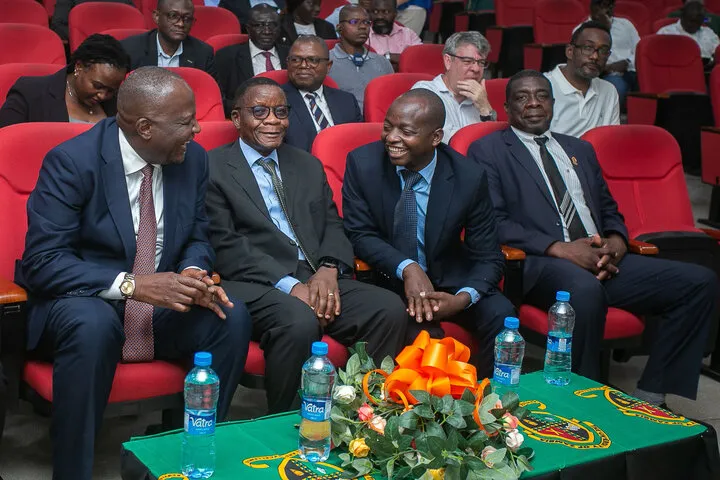
The Minister of Technology and Science, Hon. Felix C. Mutati, has urged the African Development Bank (AfDB) to strengthen its partnership with Zambia through the establishment of artificial intelligence (AI)-driven Polytechnics and support for the University of Zambia (UNZA) Innovation Village. The Minister emphasised that these initiatives will equip Zambia’s workforce with skills in emerging technologies to advance the nation’s key economic sectors of mining and agriculture.
He made the appeal during a visit by AfDB Senior Vice President, Ms. Marie-Laure Akin-Olugbade, to UNZA. The purpose of her visit was to inspect the successful completion of the Skills and Training Enhancement Project (STEP), a US$29.4 million investment launched in 2013, which included two new 350-capacity lecture theatres and refurbished facilities in the Schools of Engineering, Mines, and Natural and Applied Sciences.
In gratitude to AfDB for the support, Mr. Mutati highlighted that STEP has expanded access to skills training for over 150,000 students and awarded 11,400 merit-based scholarships, of which 24% were for girls, thus advancing gender inclusivity in STEM.
He suggested that the next phase of AfDB support should focus on emerging technologies to align with Zambia’s Vision 2030 goals. “The government aims to achieve 3 million tons of copper and 10 million tons of agricultural output by 2031, targets that require a technologically skilled workforce,” he said.
Minister Mutati proposed two strategic areas for collaboration, namely, support for the UNZA Innovation Village (I-Village) and development of AI-driven polytechnics.
He said the government is revising the education law to include polytechnic institutions and seeks AfDB’s partnership to establish a new model polytechnic. “This institution will provide skills powered by emerging technologies, especially AI, to support national industrialisation goals,” he said.
The minister indicated Zambia’s readiness for co-investment and sustainability, stating, “The old Africa of gifts is long gone. We are ready to co-invest to ensure sustainability,” he said.
Echoing the minister’s sentiment, the University of Zambia Vice-Chancellor Mundia Muya elaborated on this vision of establishing the UNZA Innovation Village (I-Village), describing it as a "state-of-the-art facility designed to catalyse innovation, entrepreneurship, and sustainable development."
He outlined the I-Village as a dynamic hub connecting academia, industry, and government to foster collaboration in key sectors such as AgriTech, HealthTech, Renewable Energy, ICT, Smart Manufacturing, FinTech, and Precision Mining.
Prof. Muya reiterated that these initiatives will catalyse innovations that align with Zambia’s Vision 2030, and support the African Union’s Agenda 2063.
The Vice-Chancellor further provided concrete details of STEP's impact on the university and reported that the project enabled six staff members to complete their PhDs, enhanced infrastructure through the refurbishment of lecture theatres and laboratories in the Schools of Engineering and Mines, and two new 350-seat lecture theatres.
He said that these upgrades were critical for accommodating the University's growing student population, which has surged from 13,579 in 2010 to 30,000 now in compliance with the Higher Education Act of 2021 regulations.
"The newly installed laboratory equipment has enabled our Schools to strengthen collaborations with industry as companies now bring materials to the University for testing, which has enabled the university to generate income that is re-invested into equipment maintenance,” he stated.
Prof Muya expressed the University's profound gratitude to the AfDB and the Government of Zambia, affirming UNZA's commitment as a partner "in advancing the national vision for a knowledge-driven, technology-enabled, and industrialised economy."
Meanwhile, AfDB Senior Vice President, Ms. Akin-Olugbade, described the project as having left a “lasting legacy” in skills development and education infrastructure, reaffirming that “investing in people is the surest path to driving Africa’s growth.”
